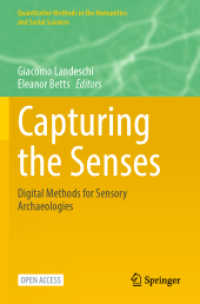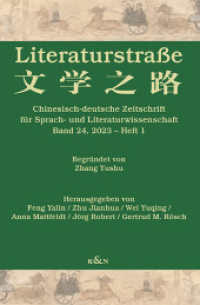- ホーム
- > 洋書
- > 英文書
- > Computer / General
Full Description
In the age of rapid technological advancements, the integration of Artificial Intelligence (AI), machine learning (ML), and large language models (LLMs) in Science, Technology, Engineering, and Mathematics (STEM) education has emerged as a transformative force, reshaping pedagogical approaches and assessment methodologies. Uses of AI in STEM Education, comprising 25 chapters, delves deep into the multifaceted realm of AI-driven STEM education. It begins by exploring the challenges and opportunities of AI-based STEM education, emphasizing the intricate balance between human tasks and technological tools. As the chapters unfold, readers learn about innovative AI applications, from automated scoring systems in biology, chemistry, physics, mathematics, and engineering to intelligent tutors and adaptive learning. The book also touches upon the nuances of AI in supporting diverse learners, including students with learning disabilities, and the ethical considerations surrounding AI's growing influence in educational settings. It showcases the transformative potential of AI in reshaping STEM education, emphasizing the need for adaptive pedagogical strategies that cater to diverse learning needs in an AI-centric world. The chapters further delve into the practical applications of AI, from scoring teacher observations and analyzing classroom videos using neural networks to the broader implications of AI for STEM assessment practices. Concluding with reflections on the new paradigm of AI-based STEM education, this book serves as a comprehensive guide for educators, researchers, and policymakers, offering insights into the future of STEM education in an AI-driven world.
Contents
Preface
1: Xiaoming Zhai and Joseph Krajcik: Introduction: AI-based STEM Education: Challenges and Opportunities
AI in STEM Assessment
2: James W. Pellegrino: A New Era for STEM Assessment: Considerations of Assessment, Technology, and Artificial Intelligence
3: Ross H. Nehm: AI in Biology Education Assessment: How Automation Can Drive Educational Transformation
4: Marcia C. Linn and Libby Gerard: Assessing and Guiding Student Science Learning with Pedagogically Informed Natural Language Processing
5: Changzhao Wang, Xiaoming Zhai, and Ji Shen: Applying Machine Learning to Assess Paper-Pencil Drawn Models of Optics
6: Mei-Hung Chiu and Mao-Ren Zeng: Automated Scoring in Chinese Language for Science Assessments
7: Megan Shiroda, Jennifer Doherty, and Kevin C. Haudek: Exploring Attributes of Successful Machine Learning Assessments for Scoring of Undergraduate Constructed Response Assessment Items
8: Lei Liu, Dante Cisterna, Devon Kinsey, Yi Qi, Kenneth Steimel: AI-based Diagnosis of Student Reasoning Patterns in NGSS Assessments
AI Tools for Transforming STEM Learning
9: Anna Herdliska and Xiaoming Zhai: Artificial Intelligence-Based Scientific Inquiry
10: Hee-Sun Lee, Gey-Hong Gweon, and Amy Pallant: Supporting Simulation-mediated Scientific Inquiry through Automated Feedback
11: Marcus Kubsch, Adrian Grimm, Knut Neumann, Hendrik Drachsler, Nikol Rummel: Using Evidence Centered Design to Develop an Automated System for Tracking Students>' Physics Learning in a Digital Learning Environment
12: Janice D. Gobert, Haiying Li, Rachel Dickler, Christine Lott: Can AI-Based Scaffolding Support Students' Robust Learning of Authentic Science Practices?
13: Ehsan Latif, Xiaoming Zhai, Holly Amerman, Xinyu He: AI-SCORER: An Artificial Intelligence-Augmented Scoring and Instruction System
14: Lei Wang, Cong Wang, Quan Wang, Jiutong Luo, Xijuan Li: Smart Learning PartnerDLDLChinese Core Competency-oriented Adaptive Learning System
AI-based STEM Instruction and Teacher Professional Development
15: Lehong Shi, Ikseon Choi: A Systematic Review on Artificial Intelligence in Supporting Teaching Practice: Application Types, Pedagogical Roles, and Technological Characteristics
16: Peng He, Namsoo Shin, Xiaoming Zhai, Joseph Krajcik: A Design Framework for Integrating Artificial Intelligence to Support Teachers' Timely Use of Knowledge-in-Use Assessments
17: 1. Abhijit Suresh, William R. Penuel, Jennifer K. Jacobs, Ali Raza, James H. Martin, Tamara Sumner: Using AI Tools to Provide Teachers with Fully Automated, Personalized Feedback on Their Classroom Discourse Patterns
18: Lydia Bradford: Use of Machine Learning to Score Teacher Observations
19: David Buschhüter, Marisa Pfläging, Andreas Borowski: Widening the Focus of Science Assessment via Structural Topic Modeling: An Example of Nature of Science Assessment
20: Jonathan K. Foster, Matthew Korban, Peter Youngs, Ginger S. Watson, Scott T. Acton: 1. Classification of Instructional Activities in Classroom Videos Using Neural Networks
Ethics, Fairness, and Inclusiveness of AI-based STEM Education
21: Sahrish Panjwani-Charania, Xiaoming Zhai: AI for Students with Learning Disabilities: A Systematic Review
22: Selin Akgun, Joseph Krajcik: 1. Artificial Intelligence (AI) as the Growing Actor in Education: Raising Critical Consciousness Towards Power and Ethics of AI in K-12 STEM Classrooms
23: Wanli Xing, Chenglu Li: Fair Artificial Intelligence to Support STEM Education: A Hitchhiker's Guide
24: Marvin Roski, Anett Hoppe, Andreas Nehring: Supporting Inclusive Science Learning through Machine Learning: The AIISE Framework
25: Xiaoming Zhai & Joseph Krajcik: Pseudo Artificial Intelligence Bias
Conclusion
26: Xiaoming Zhai: Conclusions and Foresight on AI-based STEM Education: A New Paradigm






